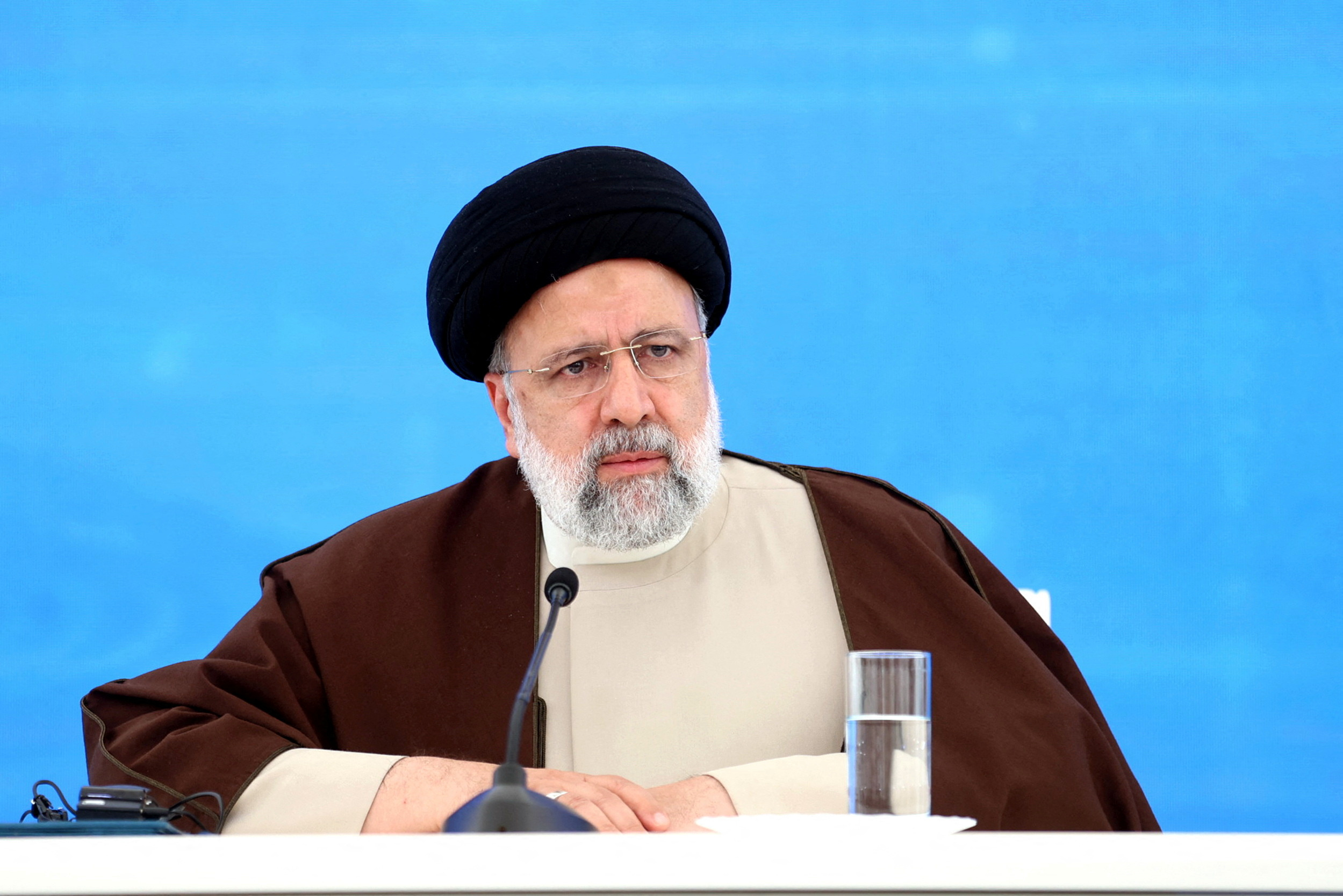Politics
Iranian President Raisi perishes in helicopter crash
Published
2 years agoon

The Islamic Republic of Iran was plunged into mourning as news broke that President Ebrahim Raisi, a prominent hardliner and potential successor to Supreme Leader Ayatollah Ali Khamenei, had been killed in a helicopter crash near the Azerbaijan border. The accident, which also claimed the life of Foreign Minister Hossein Amirabdollahian, occurred on Sunday as the two senior officials were traveling to inaugurate a joint project with Azerbaijan.
The charred wreckage of the U.S.-made helicopter was discovered early Monday morning after an intense overnight search operation in blizzard conditions. Rescue teams battled through the treacherous terrain and inclement weather to reach the crash site, but tragically found no signs of life among the passengers.
Reactions and Implications
In a statement, Vice President Mohsen Mansouri and state television confirmed the tragic demise of Raisi, the foreign minister, and all other passengers aboard the ill-fated helicopter. The cause of the crash remains under investigation, with officials noting that the aircraft appeared to have slammed into a mountain peak, though no official word on the exact cause has been released.
The news of Raisi’s death has elicited a range of reactions both within Iran and on the global stage. Supreme Leader Khamenei, who holds ultimate decision-making power in the country, sought to reassure the Iranian people, stating that there would be no disruption to state affairs despite the tragic loss.
Internationally, the White House said that U.S. President Joe Biden had been briefed on the reports, while China expressed deep concern over the incident. The European Union offered emergency satellite mapping technology to assist in the search and rescue efforts.
Raisi’s Legacy and Potential Successors
Raisi’s tenure as president was marked by a hardline approach, including a tightening of morality laws and a crackdown on anti-government protests. His election in 2021 had brought all branches of power under the control of hardliners, after eight years of a more pragmatic presidency under Hassan Rouhani.
However, Raisi’s standing may have been dented by the ongoing economic and social challenges facing Iran, as well as the widespread protests against the country’s clerical rule. With his passing, the question of who will succeed him and Khamenei as the next supreme leader of Iran has once again come to the forefront.
The Uncertain Future of Iran
The death of President Raisi comes at a particularly turbulent time for Iran, as the country grapples with a range of domestic and international crises. The loss of such a prominent figure, coupled with the broader political and economic instability, has left many Iranians and global observers uncertain about the country’s future trajectory.
As the investigation into the helicopter crash continues and the Iranian government navigates the aftermath of this tragedy, the world will be watching closely to see how the Islamic Republic responds and who emerges as the next potential leader to guide the nation through these challenging times.
The Crash Site and Search Efforts
The helicopter carrying President Raisi and Foreign Minister Amirabdollahian crashed in mountainous terrain near the Azerbaijan border, with the wreckage discovered in the early hours of Monday morning. Rescue teams faced blizzard conditions and treacherous terrain as they searched throughout the night to locate the crash site.
Footage from the scene showed the rescue team, clad in bright jackets and headlamps, huddled around a GPS device as they navigated the pitch-black mountainside on foot, battling the fierce winter weather. Despite their valiant efforts, the team tragically found no signs of life among the passengers.
The Importance of Raisi and Khamenei’s Relationship
In Iran’s dual political system, it is the 85-year-old Supreme Leader Ayatollah Ali Khamenei who holds the ultimate decision-making power on all major policies, including the country’s nuclear program and foreign affairs. Raisi, as president, was seen as a potential successor to Khamenei, with the supreme leader having previously endorsed Raisi’s key policies.
The close relationship between Raisi and Khamenei, as well as Raisi’s position as a hardliner, had significant implications for the direction of the Islamic Republic. Raisi’s death has now raised questions about the future power dynamics within the Iranian government and the potential impact on the country’s domestic and foreign policies.
Raisi’s Background and Rise to Power
Ebrahim Raisi, a 63-year-old hardliner, was elected president of Iran in 2021 after a closely managed election that brought all branches of power under the control of hardliners. Prior to his presidency, Raisi had held various high-ranking positions within the Iranian government, including serving as the head of the country’s judiciary.
Raisi’s victory in the 2021 election marked a significant shift in Iran’s political landscape, as it ended the eight-year pragmatic presidency of Hassan Rouhani and the nuclear deal negotiated with world powers, including the United States. Raisi’s hardline policies and support for Khamenei’s agenda had made him a strong contender to succeed the aging supreme leader.
The Ongoing Challenges Facing Iran
Raisi’s presidency was marked by a range of domestic and international challenges, from growing dissent within Iran over political, social, and economic issues to the country’s deepening military ties with Russia and the ongoing tensions over the nuclear program.
The widespread protests against the clerical rule and Raisi’s failure to turn around Iran’s sanctions-battered economy had dented his standing, even as he sought to tighten the government’s grip on power. With Raisi’s sudden passing, the Islamic Republic now faces an uncertain future as it navigates these complex and pressing issues.
Raisi’s Inauguration and Border Visit
On the day of the tragic helicopter crash, President Raisi had been traveling to the Azerbaijani border to inaugurate the Qiz-Qalasi Dam, a joint project between Iran and Azerbaijan. Just hours earlier, Raisi had bid a “friendly farewell” to Azerbaijani President Ilham Aliyev, who later offered assistance in the search and rescue efforts.
The inauguration of the Qiz-Qalasi Dam was seen as an important diplomatic and economic initiative for Iran, as the country sought to strengthen its ties with neighboring countries in the face of international pressure. Raisi’s untimely death has now cast a pall over this event, adding to the sense of tragedy and uncertainty surrounding the Iranian leader’s passing.
The Broader Geopolitical Implications
Raisi’s death comes at a time of heightened regional tensions, with Iran’s ally Hamas having attacked Israel on October 7th, provoking retaliatory strikes and conflagrations involving Iran-aligned groups throughout the Middle East.
The loss of such a prominent Iranian figure, who was seen as a potential successor to the supreme leader, has the potential to further destabilize the already volatile geopolitical landscape in the region. As the world watches closely, the question remains: how will Iran navigate this crisis and who will emerge as the next leader to guide the country through these turbulent times?
A Potential Turning Point for Iran
As Iran grapples with the aftermath of this devastating loss, the world will be watching closely to see how the government and the Iranian people respond. The future of the Islamic Republic hangs in the balance, and the coming months and years will be critical in determining the country’s path forward. One thing is certain: the death of President Raisi marks a tragic turning point in Iran’s history, the reverberations of which will be felt for years to come.
You may like
-


Here’s why Adani is betting $100 Billion on Data Centers
-


Sterlite Group appoints Sumil Mathur as Group CFO
-


India’s young entrepreneurs are building billion-dollar startups
-


Anthropic opens India office in Bengaluru
-


Mankind Pharma Reinvents Global Supply Chain and Procurement with Accenture
-


“Don’t build first and fix later”


